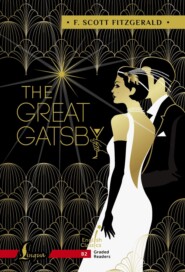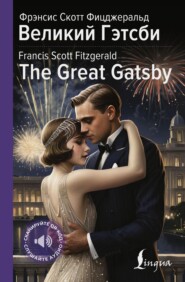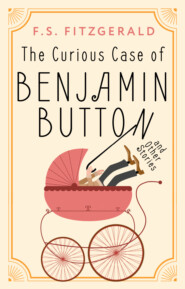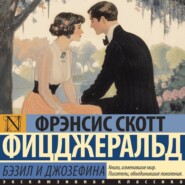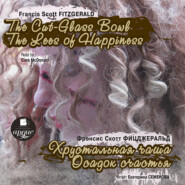По всем вопросам обращайтесь на: info@litportal.ru
(©) 2003-2025.
✖
The Great Gatsby
Год написания книги
2019
Настройки чтения
Размер шрифта
Высота строк
Поля
“The only crazy I was was when I married him. I knew right away I made a mistake. He borrowed somebody’s best suit to get married in, and never even told me about it, and the man came after it one day when he was out. ‘Oh, is that your suit?’ I said. ‘This is the first I ever heard about it.’ But I gave it to him and then I lay down and cried to beat the band all afternoon.”
“She really ought to get away from him,” resumed Catherine to me. “They’ve been living over that garage for eleven years. And Tom’s the first sweetie she ever had.”
The bottle of whiskey – a second one – was now in constant demand by all present, excepting Catherine, who “felt just as good on nothing at all.” Tom rang for the janitor and sent him for some celebrated sandwiches, which were a complete supper in themselves. I wanted to get out and walk southward toward the park through the soft twilight, but each time I tried to go I became entangled in some wild, strident argument which pulled me back, as if with ropes, into my chair. Yet high over the city our line of yellow windows must have contributed their share of human secrecy to the casual watcher in the darkening streets, and I was him too, looking up and wondering. I was within and without, simultaneously enchanted and repelled by the inexhaustible variety of life.
Myrtle pulled her chair close to mine, and suddenly her warm breath poured over me the story of her first meeting with Tom.
“It was on the two little seats facing each other that are always the last ones left on the train. I was going up to New York to see my sister and spend the night. He had on a dress suit and patent leather shoes, and I couldn’t keep my eyes off him, but every time he looked at me I had to pretend to be looking at the advertisement over his head. When we came into the station he was next to me, and his white shirt-front pressed against my arm, and so I told him I’d have to call a policeman, but he knew I lied. I was so excited that when I got into a taxi with him I didn’t hardly know I wasn’t getting into a subway train. All I kept thinking about, over and over, was ‘You can’t live forever; you can’t live forever.’”
She turned to Mrs McKee and the room rang full of her artificial laughter.
“My dear,” she cried, “I’m going to give you this dress as soon as I’m through with it. I’ve got to get another one tomorrow. I’m going to make a list of all the things I’ve got to get. A massage and a wave, and a collar for the dog, and one of those cute little ashtrays where you touch a spring, and a wreath with a black silk bow for mother’s grave that’ll last all summer. I got to write down a list so I won’t forget all the things I got to do.”
It was nine o’clock – almost immediately afterward I looked at my watch and found it was ten. Mr McKee was asleep on a chair with his fists clenched in his lap, like a photograph of a man of action. Taking out my handkerchief I wiped from his cheek the remains of the spot of dried lather that had worried me all the afternoon.
The little dog was sitting on the table looking with blind eyes through the smoke, and from time to time groaning faintly. People disappeared, reappeared, made plans to go somewhere, and then lost each other, searched for each other, found each other a few feet away. Some time toward midnight Tom Buchanan and Mrs Wilson stood face to face discussing, in impassioned voices, whether Mrs Wilson had any right to mention Daisy’s name.
“Daisy! Daisy! Daisy!” shouted Mrs Wilson. “I’ll say it whenever I want to! Daisy! Dai—”
Making a short deft movement, Tom Buchanan broke her nose with his open hand.
Then there were bloody towels upon the bathroom floor, and women’s voices scolding, and high over the confusion a long broken wail of pain. Mr McKee awoke from his doze and started in a daze toward the door. When he had gone half way he turned around and stared at the scene – his wife and Catherine scolding and consoling as they stumbled here and there among the crowded furniture with articles of aid, and the despairing figure on the couch, bleeding fluently, and trying to spread a copy of Town Tattle over the tapestry scenes of Versailles. Then Mr McKee turned and continued on out the door. Taking my hat from the chandelier, I followed.
“Come to lunch some day,” he suggested, as we groaned down in the elevator.
“Where?”
“Anywhere.”
“Keep your hands off the lever,” snapped the elevator boy.
“I beg your pardon,” said Mr McKee with dignity, “I didn’t know I was touching it.”
“All right,” I agreed, “I’ll be glad to.”
… I was standing beside his bed and he was sitting up between the sheets, clad in his underwear, with a great portfolio in his hands.
“Beauty and the Beast … Loneliness … Old Grocery Horse … Brook’n Bridge …”
Then I was lying half asleep in the cold lower level of the Pennsylvania Station, staring at the morning Tribune, and waiting for the four o’clock train.
CHAPTER 3 (#ulink_d89a4c91-eb07-5f27-8c02-22038247d51d)
There was music from my neighbor’s house through the summer nights. In his blue gardens men and girls came and went like moths among the whisperings and the champagne and the stars. At high tide in the afternoon I watched his guests diving from the tower of his raft, or taking the sun on the hot sand of his beach while his two motor-boats slit the waters of the Sound, drawing aquaplanes over cataracts of foam. On weekends his Rolls-Royce became an omnibus, bearing parties to and from the city between nine in the morning and long past midnight, while his station wagon scampered like a brisk yellow bug to meet all trains. And on Mondays eight servants, including an extra gardener, toiled all day with mops and scrubbing-brushes and hammers and garden-shears, repairing the ravages of the night before.
Every Friday five crates of oranges and lemons arrived from a fruiterer in New York – every Monday these same oranges and lemons left his back door in a pyramid of pulpless halves. There was a machine in the kitchen which could extract the juice of two hundred oranges in half an hour if a little button was pressed two hundred times by a butler’s thumb.
At least once a fortnight a corps of caterers came down with several hundred feet of canvas and enough colored lights to make a Christmas tree of Gatsby’s enormous garden. On buffet tables, garnished with glistening hors-d’oeuvre, spiced baked hams crowded against salads of harlequin designs and pastry pigs and turkeys bewitched to a dark gold. In the main hall a bar with a real brass rail was set up, and stocked with gins and liquors and with cordials so long forgotten that most of his female guests were too young to know one from another.
By seven o’clock the orchestra has arrived, no thin five-piece affair, but a whole pitful of oboes and trombones and saxophones and viols and cornets and piccolos, and low and high drums. The last swimmers have come in from the beach now and are dressing upstairs; the cars from New York are parked five deep in the drive, and already the halls and salons and verandas are gaudy with primary colors, and hair shorn in strange new ways, and shawls beyond the dreams of Castile. The bar is in full swing, and floating rounds of cocktails permeate the garden outside, until the air is alive with chatter and laughter, and casual innuendo and introductions forgotten on the spot, and enthusiastic meetings between women who never knew each other’s names.
The lights grow brighter as the earth lurches away from the sun, and now the orchestra is playing yellow cocktail music, and the opera of voices pitches a key higher. Laughter is easier minute by minute, spilled with prodigality, tipped out at a cheerful word. The groups change more swiftly, swell with new arrivals, dissolve and form in the same breath; already there are wanderers, confident girls who weave here and there among the stouter and more stable, become for a sharp, joyous moment the center of a group, and then, excited with triumph, glide on through the sea-change of faces and voices and color under the constantly changing light.
Suddenly one of the gypsies, in trembling opal, seizes a cocktail out of the air, dumps it down for courage and, moving her hands like Frisco, dances out alone on the canvas platform. A momentary hush; the orchestra leader varies his rhythm obligingly for her, and there is a burst of chatter as the erroneous news goes around that she is Gilda Gray’s understudy from the Follies. The party has begun.
I believe that on the first night I went to Gatsby’s house I was one of the few guests who had actually been invited. People were not invited – they went there. They got into automobiles which bore them out to Long Island, and somehow they ended up at Gatsby’s door. Once there they were introduced by somebody who knew Gatsby, and after that they conducted themselves according to the rules of behavior associated with amusement parks. Sometimes they came and went without having met Gatsby at all, came for the party with a simplicity of heart that was its own ticket of admission.
I had been actually invited. A chauffeur in a uniform of robin’s-egg blue crossed my lawn early that Saturday morning with a surprisingly formal note from his employer: the honor would be entirely Gatsby’s, it said, if I would attend his “little party” that night. He had seen me several times, and had intended to call on me long before, but a peculiar combination of circumstances had prevented it – signed Jay Gatsby, in a majestic hand.
Dressed up in white flannels I went over to his lawn a little after seven, and wandered around rather ill at ease among swirls and eddies of people I didn’t know – though here and there was a face I had noticed on the commuting train. I was immediately struck by the number of young Englishmen dotted about; all well dressed, all looking a little hungry, and all talking in low, earnest voices to solid and prosperous Americans. I was sure that they were selling something: bonds or insurance or automobiles. They were at least agonizingly aware of the easy money in the vicinity and convinced that it was theirs for a few words in the right key.
As soon as I arrived I made an attempt to find my host, but the two or three people of whom I asked his whereabouts stared at me in such an amazed way, and denied so vehemently any knowledge of his movements, that I slunk off in the direction of the cocktail table – the only place in the garden where a single man could linger without looking purposeless and alone.
I was on my way to get roaring drunk from sheer embarrassment when Jordan Baker came out of the house and stood at the head of the marble steps, leaning a little backward and looking with contemptuous interest down into the garden.
Welcome or not, I found it necessary to attach myself to some one before I should begin to address cordial remarks to the passers-by.
“Hello!” I roared, advancing toward her. My voice seemed unnaturally loud across the garden.
“I thought you might be here,” she responded absently as I came up. “I remembered you lived next door to—” She held my hand impersonally, as a promise that she’d take care of me in a minute, and gave ear to two girls in twin yellow dresses, who stopped at the foot of the steps.
“Hello!” they cried together. “Sorry you didn’t win.”
That was for the golf tournament. She had lost in the finals the week before.
“You don’t know who we are,” said one of the girls in yellow, “but we met you here about a month ago.”
“You’ve dyed your hair since then,” remarked Jordan, and I started, but the girls had moved casually on and her remark was addressed to the premature moon, produced like the supper, no doubt, out of a caterer’s basket. With Jordan’s slender golden arm resting in mine, we descended the steps and sauntered about the garden. A tray of cocktails floated at us through the twilight, and we sat down at a table with the two girls in yellow and three men, each one introduced to us as Mr Mumble.
“Do you come to these parties often?” inquired Jordan of the girl beside her.
“The last one was the one I met you at,” answered the girl, in an alert confident voice. She turned to her companion: “Wasn’t it for you, Lucille?”
It was for Lucille, too.
“I like to come,” Lucille said. “I never care what I do, so I always have a good time. When I was here last I tore my gown on a chair, and he asked me my name and address – inside of a week I got a package from Croirier’s with a new evening gown in it.”
“Did you keep it?” asked Jordan.
“Sure I did. I was going to wear it tonight, but it was too big in the bust and had to be altered. It was gas blue with lavender beads. Two hundred and sixty-five dollars.”
“There’s something funny about a fellow that’ll do a thing like that,” said the other girl eagerly. “He doesn’t want any trouble with anybody.”
“Who doesn’t?” I inquired.
“Gatsby. Somebody told me—”
The two girls and Jordan leaned together confidentially.






